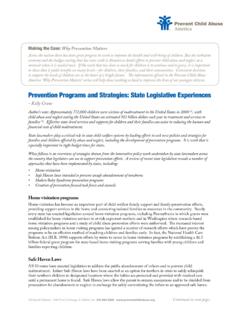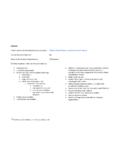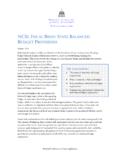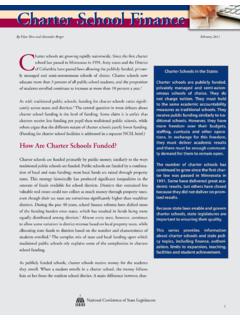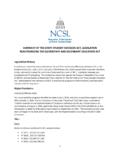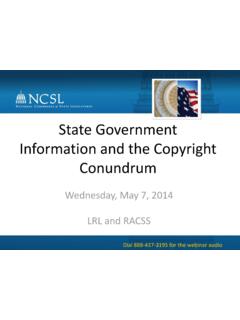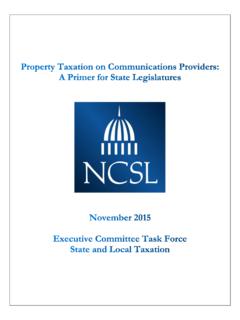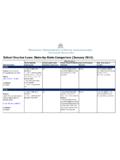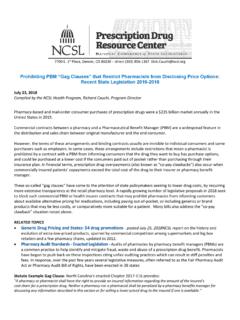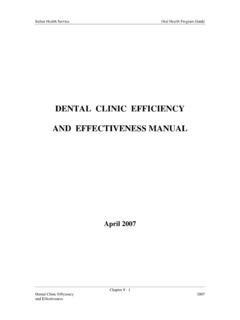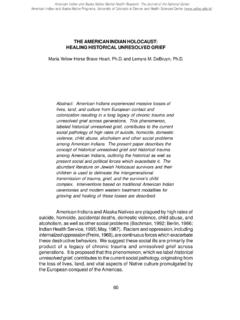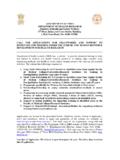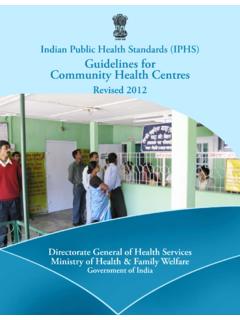Transcription of Indian Health Care Improvement Act Provisions in …
1 Indian Health care Improvement Act Provisions in the Patient Protection and Affordable care Act ( 111-148). Elayne J. Heisler Analyst in Health Services Roger Walke Specialist in American Indian Policy March 30, 2010. Congressional Research Service 7-5700. R41152. CRS Report for Congress Prepared for Members and Committees of Congress c11173008.. Indian Health care Improvement Act Provisions in 111-148. Summary On March 23, 2010, President Obama signed into law a comprehensive Health care reform bill, the Patient Protection and Affordable care Act (PPACA; 111-148). The new law will, among other things, reauthorize the Indian Health care Improvement Act (IHCIA). In addition, it makes several changes related to American indians and Alaska Natives enrolled in and receiving services from the Medicare, Medicaid, and Children's Health Insurance Program (CHIP) also called Social Security Act (SSA) Health benefit programs.
2 IHCIA authorizes many programs and services provided by the Indian Health Service (IHS), it sets out the national policy for Health services administered to indians , and it states the federal goal to ensure the highest possible Health status for indians , including urban indians . In addition, it authorizes direct collections from Medicare, Medicaid, and other third-party insurers. This report, one of a series of CRS products on PPACA, summarizes some of the key changes made in the reauthorization of IHCIA. In addition, the report summarizes the Provisions related to American indians and Alaska Natives enrolled in and receiving services from SSA Health benefit programs. PPACA will extend the authorizations of appropriations for IHCIA programs indefinitely.
3 It will also permit tribal organizations (TOs) and urban Indian organizations (UIOs) to apply for contract and grant programs for which they were not previously eligible. The law also expands the mental Health services authorized under IHCIA to create comprehensive behavioral Health and treatment programs. In addition, it requires IHS to establish new programs related to youth suicide prevention and requires demonstration projects to construct modular and mobile Health facilities in order to expand Health services available through IHS, Indian Tribes (ITs), and TOs. With regard to SSA Health benefit programs, PPACA permits specified Indian entities to determine Medicaid and CHIP eligibility and extends the period during which IHS, IT, and TO. services are reimbursed for all Medicare Part B services, indefinitely, beginning January 1, 2010.
4 Under current law, authority for these facilities to receive Medicare Part B reimbursements for certain specified services expired on January 1, 2010. PPACA also makes several organizational changes to IHS. IHS is required to establish an Office of Direct Service Tribes to serve tribes that receive their Health care and other services directly from IHS as opposed to receiving services through IHS-funded facilities or programs operated by ITs or TOs. In addition, the bill requires a plan to establish a new area office to serve tribes in Nevada and a new IHS Director of HIV/AIDS Prevention and Treatment. Congressional Research Service . Indian Health care Improvement Act Provisions in 111-148. Contents Introduction ..1. Overview of Indian Health Indian Health care Improvement Act.
5 2. IHCIA Reauthorization in Definitions ..3. Selected Major Title I: Indian Health , Human Resources, and Development ..5. Title II: Health Services ..5. Title III: Facilities ..6. Title IV: Access to Health Title V: Health Services for Urban indians ..8. Title VI: Organizational Improvements ..9. Title VII: Behavioral Health Programs ..9. Title VIII: 10. Other Provisions .. 10. SSA Health Benefit Improvements for indians .. 11. Contacts Author Contact Information .. 11. Acknowledgments .. 11. Congressional Research Service . Indian Health care Improvement Act Provisions in 111-148. Introduction On March 23, 2010, President Obama signed into law a comprehensive Health care reform bill, the Patient Protection and Affordable care Act (PPACA; 111-148), as passed by the Senate on December 24, 2009, and the House on March 21, 2010.
6 The new law will, among other things, reauthorize the Indian Health care Improvement Act (IHCIA). On March 25, 2010, the Senate modified and passed the accompanying reconciliation bill ( 4872, the Health care and Education Reconciliation Act of 2010), which had been passed by the House on March 21, 2010. The reconciliation bill changes several controversial elements in 3590 none of these changes modifies IHCIA and otherwise amends the underlying legislation so that its budgetary impact meets the reconciliation instructions in last year's budget resolution. 1 The House reapproved the reconciliation measure, with Senate modifications, on March 25, 2010. It was cleared for the White House the same day, and signed into law by the President on March 30. This report, one of a series of CRS products on PPACA, summarizes some of the key changes made in the reauthorization of IHCIA.
7 In addition, the report summarizes the Provisions related to American indians and Alaska Natives enrolled in and receiving services from Medicare, Medicaid, and the Children's Health Insurance Program (CHIP) also called SSA Health benefit programs. 2. The report begins with an overview of the Indian Health Service (IHS) and IHCIA. It then discusses each of the eight titles in IHCIA and how PPACA amends each of these titles. Finally, the report discusses how PPACA amends other acts related to Indian Health . For each title discussed, the report first gives a brief description of the context, and then describes the changes made by PPACA. Overview of Indian Health care The Indian Health Service (IHS), an agency in the Department of Health and Human Services (HHS), provides Health care for approximately million eligible American indians /Alaska Natives through a system of programs and facilities located on or near Indian reservations, and through contractors in certain urban IHS is organized into 12 Areas administered by an Area Office; Areas, in turn, are further subdivided into service units.
8 IHS may provide services directly, or Indian tribes (ITs) or tribal organizations (TOs) may operate IHS facilities and programs themselves through self-determination contracts and self-governance compacts negotiated with Although most IHS facilities are located on or near reservations, IHS also 1. Under the FY2010 budget resolution ( 13), a Health reform reconciliation bill must reduce the federal deficit by $1 billion over the period FY2009 through FY2014, as determined by the Congressional Budget Office. 2. Other Provisions in PPACA may also affect Indian Health . For example, Indian tribes may be eligible for new grant or contract programs that augment the Health care workforce or improve public Health , they may participate in reforms made to the private insurance market, and they may benefit from Medicare and Medicaid reforms.
9 More information about PPACA changes can be found at CRS's website under Issue in Focus- Health Reform at 3. Additional information about IHS can be found in CRS Report RL33022, Indian Health Service: Health care Delivery, Status, Funding, and Legislative Issues, by Roger Walke. 4. Authorized by 93-638, the Indian Self-Determination and Education Assistance Act of January 4, 1975, 88 Stat. 2203, as amended; 25 450 et seq. Congressional Research Service 1.. Indian Health care Improvement Act Provisions in 111-148. funds urban Indian Health projects (UIHPs), through grants or contracts to urban Indian organizations (UIOs). The IHS provides an array of medical services, including inpatient, ambulatory, emergency, dental, public Health nursing, and preventive Health care .
10 5 The IHS does not have a defined medical benefit package that excludes or includes specific conditions or types of Health care . Besides providing general clinical Health services, the IHS also focuses on special Indian Health problems such as maternal and child Health , diabetes, and hepatitis B. In addition, IHS provides mental Health and alcohol and substance abuse services, because American indians and Alaska Natives are more likely to die from alcoholism-related diseases or In addition to Health services, the IHS funds projects related to Health care facilities and sanitation. Specifically, the IHS will fund the construction, equipping, and maintenance of hospitals, Health centers, clinics, and other Health care delivery facilities, both those operated by the IHS and those operated by tribes.
